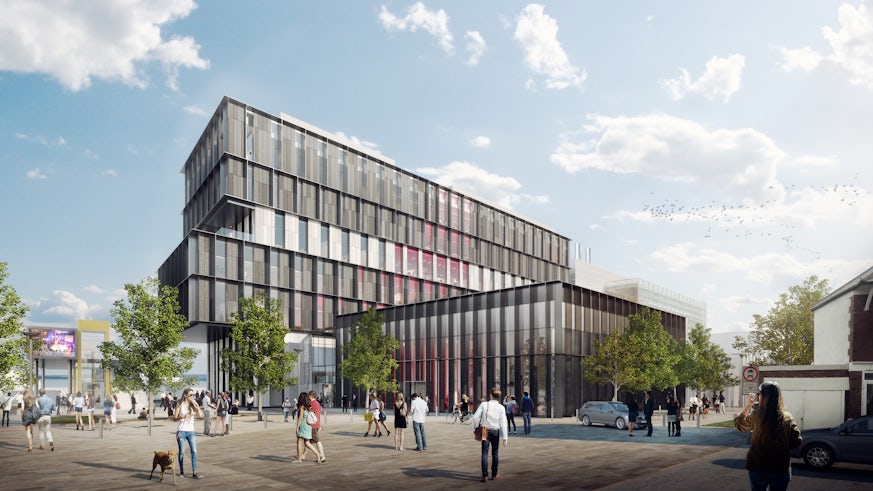Go ahead for Innovation Campus
14 November 2016

The latest phase of Cardiff University’s £300m Innovation Campus has been approved by city planners.
Two new buildings will bring researchers, businesses, public sector backers and students together to unlock ideas that drive economic growth.
They will forge processes that create technological innovations, spin-out companies, partnerships and new products and services.
Cardiff City Council’s consent paves the way for a development which brings benefits for all, from cafes and creative areas to public open spaces.
The fully-funded £135m project on the city’s brownfield Maindy Park is the latest phase in Cardiff’s mission to embed innovation in University life.
The campus vision, outlined two years ago by Vice-Chancellor Professor Colin Riordan, establishes centres of excellence that push benefits back into the economy to create a self-sustaining cycle for growth.
Professor Riordan said: “A new campus helps us create opportunities for all. Cutting-edge research, technology transfer, business development and student enterprise will put ideas to work."

“Our innovation ambitions go beyond the sum of the physical buildings. We are hiring internationally-renowned academics who can build world-class teams of post-doctoral researchers. We are equipping students with the skills they’ll need to set up future ventures. And we’re continuing to attract major UK and international funding across private and public sectors to make Cardiff the home of innovation.”
The Campus will host a range of facilities geared to innovation:
- The Institute for Compound Semiconductors - a unique UK-based translational research centre in compound semiconductors, part-funded by Welsh Government;
- Cardiff Catalysis Institute, featuring a state-of-the-art catalysis facility to support Cardiff’s leading research in chemical sciences;
- SPARK, the world’s first social science research park where academics work with private, public and third sectors to design and test solutions to societal problems;
- The Innovation Centre – a creative base for start-ups, working in partnership with the Medicentre, a clinical innovation incubator based at Heath Park.

Featuring an auditorium, cafe, and a flowing staircase, the Innovation Centre’s public areas will connect researchers with the local community, creating social interaction, recreation space, alfresco dining, and exhibition and events space.
Lettable office and lab space will be available to ventures - from small start-ups through to major corporates - who want to work directly with one of the UK’s leading research Universities.
The Campus is the third phase of development at Maindy Park following the Hadyn Ellis Building, opened in 2013, and Cardiff University Brain Research Imaging Centre, opened by Her Majesty The Queen in June.
In addition to two new buildings, each covering 12,000 sq m, this latest third phase includes a bridge linking Cardiff Business School with the Innovation Campus.
Architects Hawkins\Brown and HOK worked on the project alongside site masterplanners BDP and town planning consultancy DPP.
“Innovation Central is a really exciting project. We've worked closely with the university to develop new models for space use and the integration of industrial partners and collaborators in an HE context."
Oliver Milton, partner at Hawkins\Brown, said: “This has resulted in a very clear design with interactive working spaces organised around a central 'oculus' that connects the six storeys. Shared facilities include a Ted-ex auditorium and fabrication lab to trial new manufacturing technologies.”

Adrian Gainer, Regional Leader for HOK’s Science + Technology group, added: “We look forward to creating cutting-edge facilities that will reinforce the university’s international reputation as a leading catalysis research centre and build on its strengths in the development of semiconductor devices and materials.
“Both the Institute for Compound Semiconductors and the Cardiff Catalysis Institute have been designed to enable multidisciplinary research to flourish, with inspiring spaces to attract and retain the most talented individuals.”
Martin Jones, BDP, said: “The Campus fulfils a number of aspirations for Cardiff University and aims to facilitate world-leading scientific research, inter-disciplinary mixing and increase student opportunities in an environment that’s better for business.”
Gareth Hooper, DPP, added: “We worked very closely with the University and Cardiff Council to ensure that this exciting scheme could be delivered within an outline planning consent dating back to 2010. The result is the continuation of an exciting regeneration project, delivering physical change to the city through world-leading science.”
Cardiff University hopes to start work on site early in 2017.
Share this story
Learn how our cutting-edge research, technology transfer, business development and student enterprise drive our vision.


